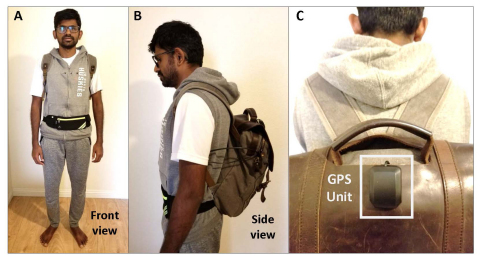SANTA CLARA, Calif. — (BUSINESS WIRE) — March 24, 2021 — What’s New: Artificial intelligence (AI) developer Jagadish K. Mahendran and his team designed an AI-powered, voice-activated backpack that can help the visually impaired navigate and perceive the world around them. The backpack helps detect common challenges such as traffic signs, hanging obstacles, crosswalks, moving objects and changing elevations, all while running on a low-power, interactive device.
This press release features multimedia. View the full release here: https://www.businesswire.com/news/home/20210324005072/en/

Jagadish K. Mahendran models his AI-powered, voice-activated backpack that can help the visually impaired navigate and perceive the world around them. (Graphic: Business Wire)
“Last year when I met up with a visually impaired friend, I was struck by the irony that while I have been teaching robots to see, there are many people who cannot see and need help. This motivated me to build the visual assistance system with OpenCV’s Artificial Intelligence Kit with Depth (OAK-D), powered by Intel.”
–Jagadish K. Mahendran, Institute for Artificial Intelligence, University of Georgia
Why It Matters: The World Health Organization estimates that globally 285 million people are visually impaired. Meanwhile, visual assistance systems for navigation are fairly limited and range from Global Positioning System-based, voice-assisted smartphone apps to camera-enabled smart walking stick solutions. These systems lack the depth perception necessary to facilitate independent navigation.
“It’s incredible to see a developer take Intel’s AI technology for the edge and quickly build a solution to make their friend’s life easier,” said Hema Chamraj, director, Technology Advocacy and AI4Good at Intel. “The technology exists; we are only limited by the imagination of the developer community.”
How It Works: The system is housed inside a small backpack containing a host computing unit, such as a laptop. A vest jacket conceals a camera, and a fanny pack is used to hold a pocket-size battery pack capable of providing approximately eight hours of use. A Luxonis OAK-D spatial AI camera can be affixed to either the vest or fanny pack, then connected to the computing unit in the backpack. Three tiny holes in the vest provide viewports for the OAK-D, which is attached to the inside of the vest.
“Our mission at Luxonis is to enable engineers to build things that matter while helping them to quickly harness the power of Intel AI technology,” said Brandon Gilles, founder and chief executive officer, Luxonis. “So, it is incredibly satisfying to see something as valuable and remarkable as the AI-powered backpack built using OAK-D in such a short period of time.”
The OAK-D unit is a versatile and powerful AI device that runs on Intel Movidius VPU and the Intel® Distribution of OpenVINO™ toolkit for on-chip edge AI inferencing. It is capable of running advanced neural networks while providing accelerated computer vision functions and a real-time depth map from its stereo pair, as well as color information from a single 4k camera.
A Bluetooth-enabled earphone lets the user interact with the system via voice queries and commands, and the system responds with verbal information. As the user moves through their environment, the system audibly conveys information about common obstacles including signs, tree branches and pedestrians. It also warns of upcoming crosswalks, curbs, staircases and entryways.
More Context: A Vision System for the Visually Impaired (Case Study) | Visual Assistance System for the Visually Impaired (Video) | Intel OpenVINO Toolkit | Artificial Intelligence at Intel
About Intel
Intel (Nasdaq: INTC) is an industry leader, creating world-changing technology that enables global progress and enriches lives. Inspired by Moore’s Law, we continuously work to advance the design and manufacturing of semiconductors to help address our customers’ greatest challenges. By embedding intelligence in the cloud, network, edge and every kind of computing device, we unleash the potential of data to transform business and society for the better. To learn more about Intel’s innovations, go to newsroom.intel.com and intel.com.
Intel is committed to respecting human rights and avoiding complicity in human rights abuses. See Intel’s Global Human Rights Principles. Intel’s products and software are intended only to be used in applications that do not cause or contribute to a violation of an internationally recognized human right.
© Intel Corporation. Intel, the Intel logo and other Intel marks are trademarks of Intel Corporation or its subsidiaries. Other names and brands may be claimed as the property of others.
View source version on businesswire.com: https://www.businesswire.com/news/home/20210324005072/en/
Contact:
Liz Wu
503-696-2098
liz.wu@intel.com


